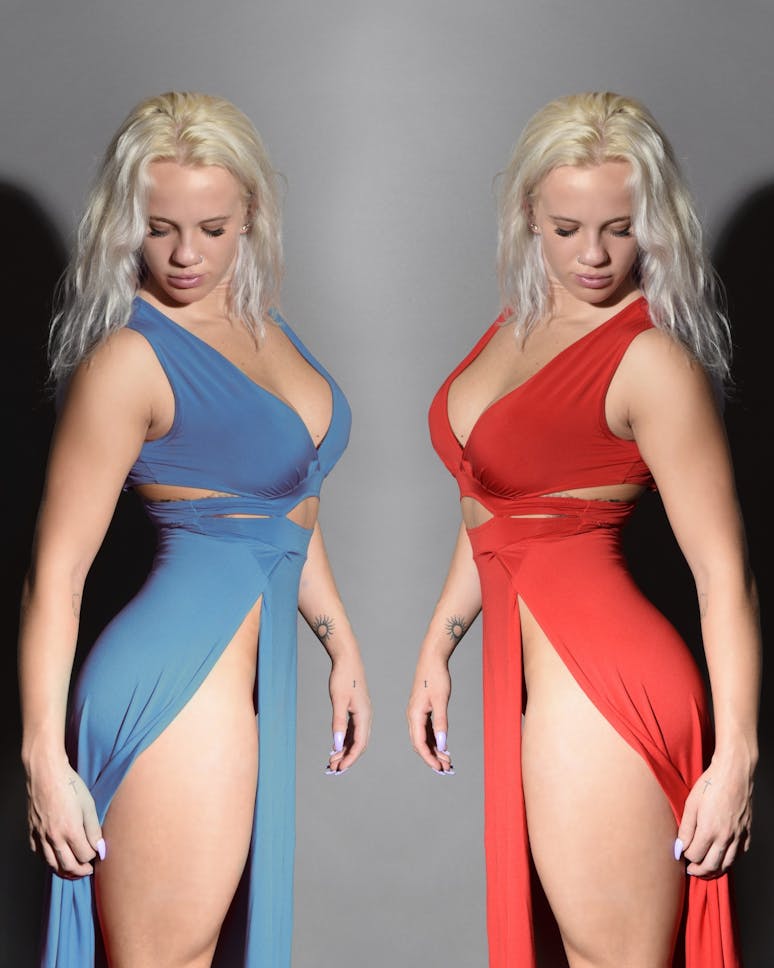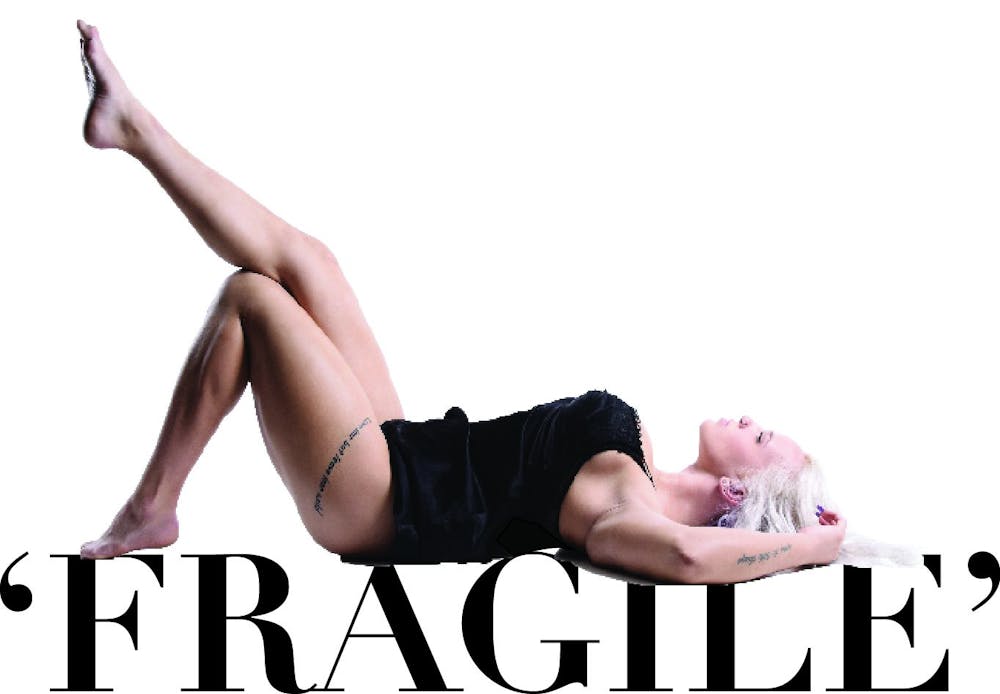Editor's note: This article refers to sensitive topics such as assault which could upset some readers.
Haley Sheehan stands at the podium in front of her public speaking class, notecards in hand.
She’s the first to present all semester.
She looks at her professor and the 24-person audience and nods, signaling she’s ready. She takes a deep breath.
“I’m a stripper,” she says.
Her candor shocks her peers. The three-word opener couldn’t be a more perfect introduction to her blunt, carefree demeanor.
But, once Sheehan starts talking, it is clear to see her introduction is just that: the beginning. There’s more to her.
She’s fragile.
Sheehan knows men look at her.
When they find out she’s a stripper, their looks turn to leers.
“It’s like they turn into animals sometimes, I swear to God,” Sheehan said. “I’ve seen some guys I’ve known at UB that are really sweet to me come in [to the club] and … they just act crazy, say all these demeaning crazy things. Like I still have to see you next week dude.”
When she does see them again, she acts normal, like they haven’t seen her almost naked. The dances, she reminds herself, weren’t for them; they’re for the money.
And the money pays her UB tuition. It pays for her off-campus apartment. And it has since 2018.
Sheehan lost her anticipated scholarship when UB cut its rowing team in 2016. A friend recommended stripping, and she hasn’t looked back since.
Her mom knows she strips. Her dad “has a feeling.”
But they both know she’s graduating college debt-free.
Her manager knows she’s a UB student. He lets her do homework in his office between dances.
“Sometimes I’m really tired,” she said of her dual roles. “But you know, school comes first. The reason I’m at the club is to put myself through school, so I know it’s something I’ve got to get done.”
Some regulars know she’s a student, too. She tells them when she’s working the floor, talking with them for tips.
Those moments are important; they bring in money.
Those moments are hard; they make her vulnerable.
She’s had to learn how much to share. The men, some of whom are married, usually just want to talk to “Fortune,” who dresses in black and makes them feel young and important.
But most don’t get to know Haley.
They don’t get to know the extroverted, junior exercise science major who spent nine hours a day at her younger brother’s bedside after a car accident left him in a coma.
They don’t get to know the girl who struggled with bulimia for seven years, and is diagnosed with manic depression.
Or the girl who found, lost and renounced religion.
But they don’t want to know. They just want to watch Fortune dance.
Fortune fulfills fantasies.
Haley has dreams.
“I definitely separate myself. You have to. Especially when you’re in there just talking to customers, you have to dissociate a little bit, or else they’d probably eat me alive. … I feel like if I didn’t dissociate, I would probably be absolutely insane.”
Haley and Fortune are both part of Sheehan, who wants to graduate next year, open a gym and use some of the skills she’s learned in the club to build her professional life.
She hopes to look back on this time with pride, and $150,000 in her bank account.
But for now, she’s embracing the opportunities her lucrative profession provides.
“I’d say my favorite way to make money is probably on stage. When you’re on stage, it’s like this weird adrenaline rush. When someone starts throwing hundreds of dollars at you, you start bustin’ out moves that you did not even know you had to begin with, and it’s a good feeling. Honestly, it’s fun.”
‘Whirls and twirls and twerkin’’

Sheehan started stripping after UB unexpectedly cut the rowing team in 2016, which cost her a scholarship that would have covered “half of tuition and half of living expenses,” she said. She tried selling weed, but the money was meager and she didn’t want to go to jail for a “petty drug crime.”
Then a friend told her about the club. She didn’t have any experience stripping, but she had always been exceptionally athletic and good on the dance floor. She was hired immediately.
Now, she makes $2,000 a week for three seven-hour shifts.
Her salary is over six times what she would make waitressing.
On campus, Sheehan blends in, wearing jeans, Timberlands and her teddy-bear coat. She takes her classes and her work at the club equally seriously; both are propelling her toward a future as a gym owner, she says.
Even at school, she carries Fortune inside her; she also carries Fortune’s bras, onesies and thongs in her trunk. Unlike some strippers, she keeps her look “simple,” she said, straying from long eyelashes and sparkles.
“I don’t do anything crazy. My client base is very simple men and I don’t think that would make me money,” Sheehan said. “But it’s dark as hell in there so honestly you could look like s--t. Nobody would even know.”
She’s found it safer to work at the club on the day shift, as night patrons are more rowdy, grabby and dangerous, she said. The Spectrum is not printing the name of the club where she works to protect her privacy.
“The night shift is just not for me,” Sheehan said. “I’ve been hit by dudes on night shift. … There’s been a couple stabbings at night. It’s just not a scene that I want anything to do with.”
There’s a predetermined line-up of dancers at the club, and when Sheehan’s ready, she tells the DJ and waits to be called on stage.
Her style is like “a ‘90s rock and roll music video,” according to her clients, and she starts and ends her set in the same outfit, rather than performing a striptease.
“I can flip off the stage into someone’s lap and do all types of flips and tricks on a chair and not a lot of girls do that. I think that’s a good moneymaker.”
When Sheehan isn’t performing, she works the floor, talking to customers, getting tips and taking them to the back for private dances.
“The hardest part for me wasn’t on dancing on stage … it was honestly talking to people,” Sheehan said. “It’s a really weird situation, just having to approach someone. You eventually learn how to work people really well, you know the type of guy you’re dealing with and what their fantasy is, as we’re supposed to be these walking, living fantasies. That was really hard for me.”
Now, she said she doesn’t mind being a walking fantasy, as long as she gets paid.
“I get sick of it when I’m not making money. If I’m making a lot of money, though, I will be a fantasy all day.”
She thinks the skill will pay off in the future, make her a more astute manager, gym owner and people reader.
She also works bachelor parties, where she strips naked and earns more. She worries about seeing people she knows or family members and having to perform while they watch. So far, it hasn’t happened. A few times, people have approached her asking if she works out at their gym.
“I’m like, ‘No, that’s my twin, but we have the exact same tattoos,’” Sheehan laughed. “It’s really bad ‘cause these dudes really already stare at me and they just saw my vagina.”
Sheehan said she doesn’t act like “your stereotypical stripper.”
She doesn’t speak in high-pitched voices or call people daddy.
She also won’t lie.
She says she won’t tell a client “you’re so sexy,” “when they’re literally the ugliest thing.”
She sees some of her coworkers put on a show and some who think they’re better than other dancers, but that’s not Sheehan’s style.
“We’re all here getting naked for money. It’s really that simple.”
She’s up front about her boundaries, and doesn’t let customers touch her much.
“I don’t think I make enough money for that. … I am very straightforward with that because that’s something I do not f--k with and something I don’t have tolerance for.”
Men have asked Sheehan to come home with them, some “full throttle go for the no-no square” during private dances, she said.
Her response is clear.
“Dude, I’m getting paid $15 a song right now. No. No.”
Bouncers walk the dancers to their cars after work to make sure no one follows them. But in the club, Sheehan said she is assaulted verbally and physically every shift.
People say “degrading bulls--t” just because they can, they try to grab her while she dances.
This prompted Sheehan to conduct a “survey at the club,” where she asked the women she works with if they have been sexually assaulted on or off the job.
Only one of 50 girls hadn’t.
‘Started to hate myself’
Sheehan was raped when she was 14.
Her abuser was a friend-of-a-friend. He left her in an abandoned hotel room for 48 hours. The police found her, but she never reported the crime.
Sheehan didn’t tell anyone about her assault until two years later, when she was going on vacation with a friend and knew her abuser would be there.
“I was just so young and I didn’t understand why it happened to me,” Sheehan said. “You kind of start to ask questions like, ‘Well what was I doing?’ –– even though that’s not the case, you know, it’s not the case –– ‘What was I doing that made that happen?’ Or ‘Did I give this guy the wrong idea? What did I say? Was I being promiscuous? Did I seem like I wanted it?’ Obviously I didn’t. But being so young and not really understanding, not even learning sex yet, it gives you a really distorted view of sexual relationships.”
She started to hate herself; she didn’t look at herself the same. She spent her high school years struggling with bulimia and manic depression and self-harming. She once cut her thighs so deeply she was hospitalized.
Sports became her outlet. She started using workouts as therapy.
She remembers when she first started working out, scars covered her thighs and her “idol” in the gym approached her.
“She came up to me and she was like ‘I just want to let you know’ –– and I started sobbing –– she said ‘I just want to let you know I’ve been through this and I have scars too. And I think you’re so inspiring coming in here wearing your short little shorts, not giving a f--k who sees because f--k what anyone else thinks,’” Sheehan said.
This inspired her, and the more she worked out, the more she started to heal. Her fitness journey wasn’t always positive, and she used to pass out from overworking her food-deprived body.
Now, she spends every day in the gym.
Nick Patterson has been friends with Sheehan since third grade and has seen her through these hard times. He said Sheehan’s non-stop schedule keeps her from falling back into the negativity of her past.
“She likes to keep herself busy,” Patterson said. “I think it’s a good way for her to not slip into that dark place that she’s been in for half of her life.”
But her “dark times” didn’t end after high school.
During Sheehan’s sophomore year at UB, her brother, Taylor, totaled his car. He drove into a tree going 70 mph under the influence of alcohol, and went into a coma instantly.
“I couldn’t help but feel like some of it was my fault,” Sheehan said. “You know, I saw that he kind of had addiction problems and alcoholism and I would try to stop it but I went to my parents and he would just scheme his way out.”
Taylor was in a coma for 31 days. Doctors said he was going to die, according to Sheehan, and if he lived, he would never be the same.
“That was honestly probably one of the worst things I’ve ever experienced in my life,” Sheehan said.
She spent every day in the hospital from noon to 9 p.m.
“Every day she would find a way to come see me, no ifs, ands or buts,” Taylor said. “Luckily I am here today, but when I woke up, Haley was nothing but caring and never was angry at me for what I put her and the rest of my family through.”
Sheehan doesn’t dwell on her past trauma. It made her who she is today: fragile and fearless.
‘Keep s--t moving’

It’s a Tuesday after class.
Sheehan lounges in a sweatsuit, two gold chains and black Timberlands that match her long, coffin-shaped, matte black nails.
She looks intimidating, but when she talks, she feels like a best friend.
“A lot of people probably think I’m too bold. A lot of people probably hate on me,” Sheehan said. “[When] I’m getting into my [Dodge] Challenger with my gold chains on, people are probably like ‘Who the f--k does this b---h think she is?'’”
Sheehan is confident and admits she’d be nowhere without hard work, positivity and the social support which pulled her out of her darkest times.
“I kind of just had this attitude that was like, that sucked but I’m not going to give a piece of my life to this person that did that,” Sheehan said. “I’m not going to sit here and cry all day or not continue with my life, my sexual life, whatever it is. I gotta keep s--t moving.”
Her plans include moving out of state and opening her own gym, training athletes who are just as dedicated to fitness as she is.
Sheehan balances her roles enigmatically.
And while she aspires to train others, she hopes her story can do the same for students who might feel fragile, just like her. Because her job may be untraditional, but her experiences are shared by many.
“Like, yeah, I might have to deal with a--holes all day, but a lot of people have to deal with a--holes all day,” Sheehan said. “Imagine working at Tim Hortons, five o’clock in the morning on a Monday. God, you couldn’t pay me enough to do that. And when I think about that, I’m like, ‘Honestly, I don’t mind dancing.’”
Jacklyn Walters is the managing editor and can be reached at jacklyn.walters@ubspectrum.com and on Twitter @JacklynAWalters.

Jacklyn Walters is a senior communication major and The Spectrum's managing editor. She enjoys bringing up politics at the dinner table and seeing dogs on campus.





